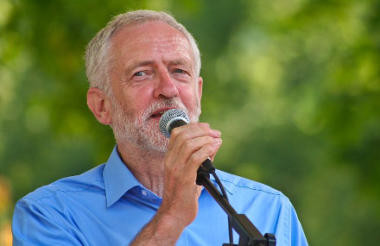At the Edinburgh TV Festival yesterday Jeremy Corbyn, leader of the Labour Party, proposed giving not-for-profit media organisations charity status. But does anyone actually want this? And would it really help?
Delivering the Alternative MacTaggart lecture, he argued that granting charitable status to local, investigative and public interest journalism outfits would “greatly help pioneering not-for-profit organisations, like the Bureau of Investigative Journalism, to fund their vital work through tax exemptions, grants and donations”.
On the surface it seems like a tidy solution to the financial woes for many newspapers struggling to stay afloat amid falling circulation and a decline revenue from advertisers who have switched their spending to Facebook and Google.
The tax breaks linked to charity status would certainly be welcomed by these organisations. And being a charity does make it easier to access some kinds of funding, although it is possible for organisations that are not charities to receive grant funding.
The idea that charitable status could nudge the press in a more ethical direction is also an attractive notion.
The debate around whether to consider journalism as charitable has actually been bouncing around for ages and I think there might be a few reasons that it has yet to have made much progress.
Who benefits?
Would the increased scrutiny from the Charity Commission and reporting burden make it worthwhile? Journalists have been reluctant to embrace new media regulation such as those proposed by the Leveson Inquiry, so I’m not sure many would be quick to embrace the prospect of charity regulation.
Is it even fair to expect the Charity Commission or Fundraising Regulator to oversee yet another sub-sector, especially if there was no extra resourcing?
There are already well-documented issues with charitable think tanks getting into trouble with the regulator for not being balanced enough. It is likely that media outlets would run into similar issues or find it difficult to carry controversial opinion pieces, unless charity law is changed.
Journalism is quite messy, there are a lot grey areas in journalism and a lot of judgement calls – no two editors will ever agree entirely. And the exact definition of journalism is quite fluid – most recently, social media and the internet have made it easier for anyone with something to say to find an audience (there are pros and cons to this that are too lengthy to go into here).
I’m also not sure that media organisations becoming charities would be of any benefit to the wider sector. By and large they don’t look or behave as charities do and the chances are that one will mess up, drawing negative publicity for themselves and the sector.
We already know that the public doesn’t like it when charities don’t behave as they expect them to, and they really don’t like it when they discover that something they didn’t think was a charity has both behaved badly and benefited from charity tax breaks.
This is why there are frequent questions about whether bodies like independent schools, think tanks and religious bodies deserve charity status. Before conferring charity status on another sector we need to be confident that there is genuine public support for it.
In any case, some charities have already set up publications as part of their activity, which are considered, rightly in many cases, to be carrying out important journalism.
Instead of dumping a huge chunk of the media sector onto the charity sector it might instead be better to look at other ways to support news outlets, such as through changing tax rules, widening access to journalism training opportunities, access to funding and building better links between larger media organisations and smaller local or specialist ones.
Related articles












